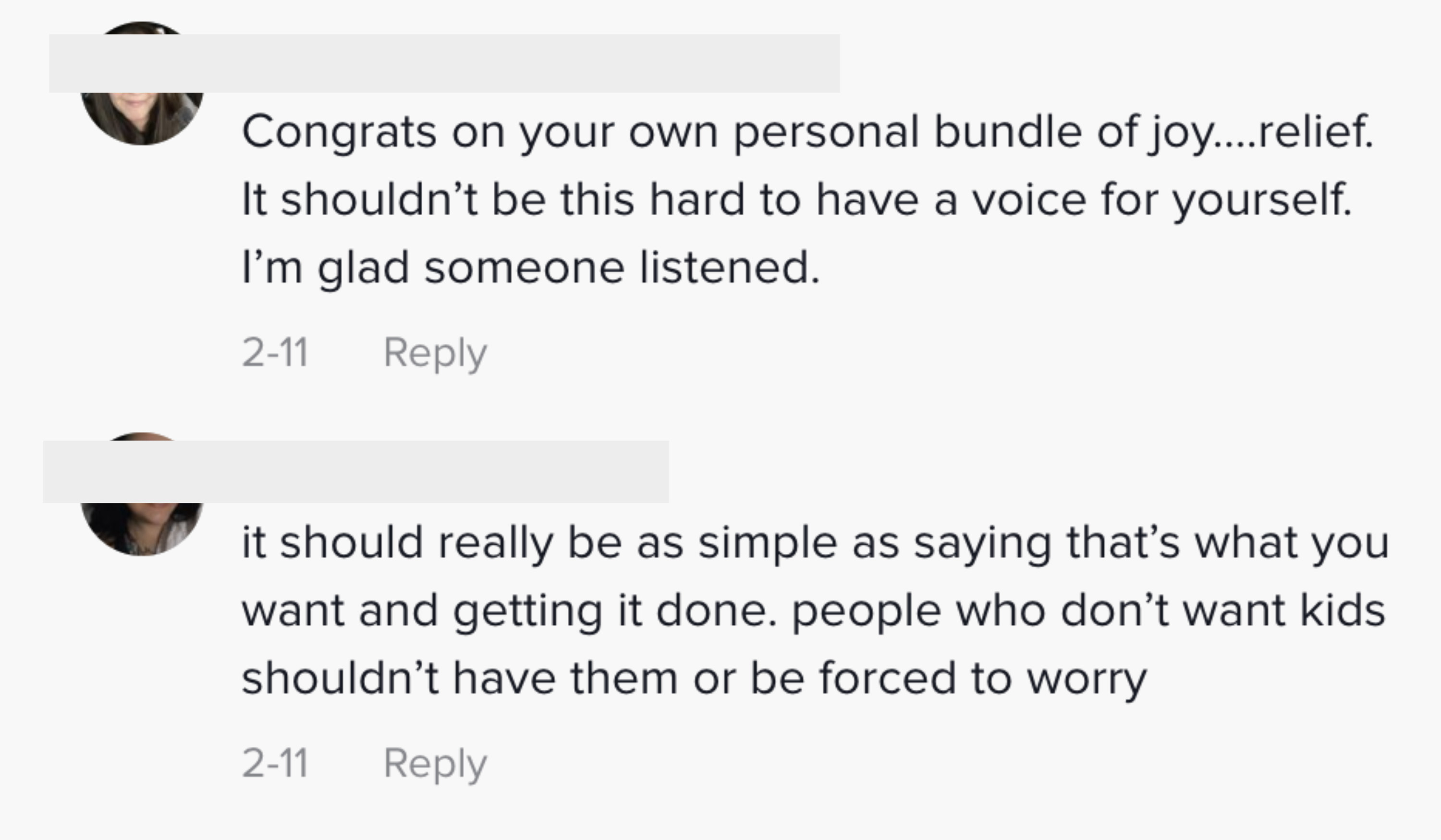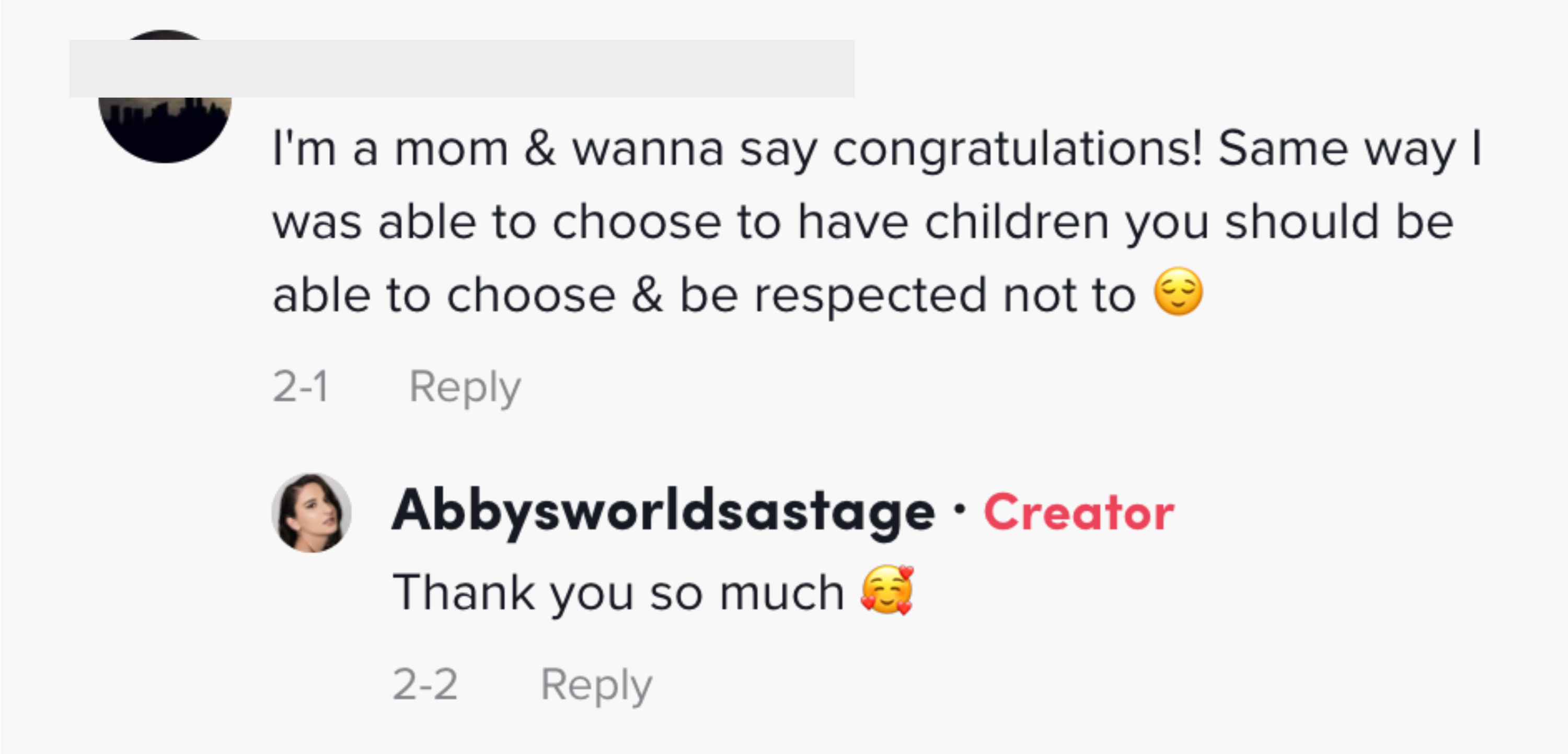Lately, it's felt unlikely for someone to scroll through social media without coming across photos of a pregnancy announcement or from gender reveal parties and baby showers. Perhaps that's part of the reason why over 3.8 million people were taken in by 24-year-old Abby Ramsay, who posed for a tongue-in-cheek sterilization photo shoot.

On February 4, Abby underwent a combination surgery including a bilateral salpingectomy, in which doctors remove both fallopian tubes, thereby withdrawing an egg's pathway from the ovaries to the uterus, as well as an endometrial ablation, which removes a layer of the endometrium — aka the tissue lining a uterus.
According to Johns Hopkins Medicine, removing this layer of the endometrium reduces the chance of pregnancy because "the endometrial lining, where the egg implants after being fertilized, has been removed."
Abby chose this combination not only to eliminate her chances of having an unwanted pregnancy, but also for the relief endometrial ablations can offer those, like Abby, who experience long, heavy periods that interrupt their daily life. For 9 in 10 women, endometrial ablation can greatly reduce menstrual flow and sometimes get rid of it altogether. However, ReproductiveFacts.org reports that this may not always last. Some people may begin experiencing long-lasting, heavy bleeding several years post-op, in which case their uterus may need to be removed.
Other surgical options for those with a uterus seeking sterilization include tubal ligation, a procedure commonly known as getting your tubes tied, in which doctors cut, tie, or seal the fallopian tubes. This is the most common form of permanent birth control and 99% effective.
Or a hysterectomy — the complete removal of the uterus — is also available.
A non-surgical option would be a hysteroscopic sterilization, where doctors use a scope to insert metal coils into the fallopian tubes. After placement, a person's body will begin to grow tissue around the coils, thereby preventing eggs from traveling from the ovaries to the uterus.
Without insurance, Abby said her bill would have been around $116,000, but her total out-of-pocket cost totaled $1,000. Most insurance companies do cover permanent birth control options.
For viewers, news of Abby's surgeries is recent, but for Abby, this was a long time coming. It took her six years to find a doctor willing to perform the surgery, despite expressing her desire to never have children and live life without concern or pain — an experience echoed throughout her comment section as other people interested in similar surgeries lamented about their own struggle to find physicians:

When speaking to BuzzFeed about why doctors she consulted with refused to perform the operation, Abby said, "The main reasonings they gave were age, and possibility of regret."
Doctors showing reluctance to sterilize patients is not uncommon. When speaking to the Chicago Tribune, one Ohio-based physician echoed this concern about women changing their minds later in life. However, according to a study conducted by the US Collaborative Review of Sterilization, only 12.7% of women reported feeling regret within their first 14 years post-surgery.
About 1 in 5 of those who expressed regret were under the age of 30. But for those warning Abby about the possibility of future discontent, she said, "[It's] better to regret not having a kid than to have one and regret it. At the end of the day, if I regret it, I am the only one suffering for it.
I think a lot of people ignore the fact that sometimes people regret becoming parents [too]. It’s not uncommon, even if it is taboo to talk about. I honestly think we should talk about parental regret more instead of pretending that parenthood is perfect and magical. Societal pressure to procreate hurts everyone, and maybe more parents could get help if we talked about it more."
Despite her conviction, that didn't make the process of finding a doctor any less difficult. "There were times I went home crying. Other times I just wanted to scream. Other times I just felt numb and empty. It was frustrating," Abby said. "My pain and my desires and my goals and my life were all dismissed because of a baby that didn’t even exist. A hypothetical person had more control over my future than I did."
When serving in the best interest of a patient, doctors are meant to put aside all bias. However, time and time again, that is not the case, and women in the comment section of Abby's video are just a fraction of those who believe others shouldn't have to jump through hurdles to make informed decisions about their bodies.

For greater context on the difficulties people may face when seeking permanent birth control, BuzzFeed spoke to Dr. Kiarra King, who has been a practicing OB-GYN for 15 years.
"Many states have laws surrounding permanent sterilization. There are age requirements, i.e., one must be at least 21 years old to consent to a sterilization procedure. Additionally, some insurance companies may require that consent forms are completed by the patient and her physician that thoroughly outline the nature of the procedure and that it will render them sterile," Dr. King continued.
"With all of that being said, I believe that if a patient has been properly informed, i.e., informed consent, is aware of the risks, benefits, and alternatives to sterilization, has been give adequate time to make a decision, and is certain that she desires the surgery, then she should be able to proceed unencumbered."
Throughout Abby's comment section, many who have chosen to carry children also agree that the decision should be up to the individual. "I'm a mom and wanna say congratulations," one user wrote to Abby. "Same way I was able to choose to have children, you should be able to choose and be respected not to."

Abby found that respect after finding the doctor who finally said "yes," though she didn't know it at the time. In fact, she walked into the doctor's office with a packet of information and her reasoning, as well as prepared answers for the questions and hypotheticals physicians had thrown at her in the past. "But she didn’t need it," Abby said. "All she needed was to listen to me for five minutes before saying alright, and immediately telling me my options, and procedures she thought might be right for me. I almost burst into tears of joy right then and there."
Not having to over-explain herself and campaign for a procedure she wanted was the ultimate relief. "While I have many reasons for not wanting to get pregnant and wanting to be child-free — from genetics to fears and medical concerns — at the end of the day, 'I don’t want to have kids' is reason enough and should be respected," Abby concluded.
If you'd like to keep up with the 24-year-old post-op, she's answering questions on TikTok.
